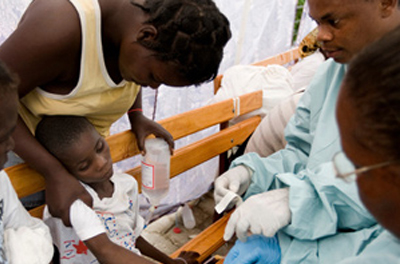Haiti Scales Up Nutritional Security and Social Safety Nets

Summary
Children in Haiti are born into harsh conditions, and malnutrition is widespread, taking a devastating human and economic toll.1 To combat malnutrition, the government of Haiti approached the World Bank for help in strengthening the country’s nutritional security and safety net programs. Haiti chose to participate in a Bank-supported knowledge exchange with Chile, El Salvador, Colombia, Madagascar, and Rwanda. Nutritional program experts from these countries went to Haiti to help the government better understand the link between nutrition and human capital and to learn to implement community-based nutrition programs.
The exchange helped inform the policy discussions related to Haiti’s nutrition programs and highlighted the need to invest in preventing chronic malnutrition rather than in treating acute malnutrition.
Haitian policymakers also learned how to better implement community-based nutrition systems. This was expected to help in the design and development of the community-based Household Development Agent pilot project.
Beneficiaries / Participants
Malnutrition – a result of ongoing food, fuel, financial, and natural disasters – takes a serious and lasting toll on Haiti’s children, making them more susceptible to disease and death, and compromising their cognitive and physical development. In economic terms, the physical and intellectual impairments caused by micronutrient deficiencies cost the Haitian economy over US$56 million annually in lost productivity.2
To fight hunger and malnutrition and to speed up its economic recovery from a devastating earthquake, Haiti wanted to improve nutritional security and safety net programs. Government officials approached the World Bank to help broker a knowledge-sharing experience with countries that have implemented successful safety net initiatives. With the Bank’s help, Haiti chose Chile, El Salvador, Colombia, Madagascar, and Rwanda because of their knowledge and experience in these topics.
The World Bank facilitated a two-week knowledge exchange for government officials, policymakers, and members of civil society organization and social services programs from the five providing countries to visit government officials in the Ministries of Finance, Planning, Health, Social Affairs and Education, as well as members of donor, civil society, and public sector funding organizations in Haiti. The aim of the exchange was to help the Haitian government better understand the link between nutrition and human capital – a key factor in Haiti’s economic recovery – and learn how to develop community-based nutrition programs and a beneficiary registry system.

 China
China Colombia
Colombia Denmark
Denmark India
India Indonesia
Indonesia Mexico
Mexico Russian Federation
Russian Federation Spain
Spain United Kingdom
United Kingdom